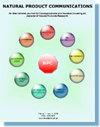Effect of Lavender Essential Oil Topical Treatment on the Autonomic Nervous System in Human Subjects Without Olfactory Influence: A Pilot Study
IF 1.4
4区 医学
Q4 CHEMISTRY, MEDICINAL
引用次数: 0
Abstract
Objective/backgroundAs part of a scientific study into the effects of aromatherapy, we investigated the effects of lavender essential oil (LEO) treatment on the autonomic nervous system in subjects for whom the sense of smell had been eliminated.MethodsThis study used a single-blinded cross-over design for verification. Heart rate variability was measured and effects on the autonomic nervous system were investigated.Results and discussionAlthough no significant differences were found, aromatherapy treatment with 1% LEO tended to increase parasympathetic nervous system activity. Further, when differences between values before and during aromatherapy treatment were compared, LEO treatment significantly increased parasympathetic nervous system activity. Given these findings, LEO appears to increase parasympathetic nervous system activity, even in the absence of a psychological effect due to an absence of olfactory stimulation.ConclusionThe present results provide a scientific method for verifying the effects of aromatherapy and will aid in further elucidation of aromatherapy.薰衣草精油局部治疗对人体自主神经系统的影响(无嗅觉影响):一项试点研究
目的/背景作为芳香疗法效果科学研究的一部分,我们调查了薰衣草精油(LEO)治疗对嗅觉被消除的受试者自律神经系统的影响。结果与讨论虽然没有发现显著差异,但使用 1% LEO 进行芳香疗法往往会增加副交感神经系统的活动。此外,当比较芳香疗法前和芳香疗法期间的数值差异时,LEO疗法明显增加了副交感神经系统的活动。鉴于这些发现,LEO 似乎可以增加副交感神经系统的活动,即使由于没有嗅觉刺激而没有心理效应。
本文章由计算机程序翻译,如有差异,请以英文原文为准。
求助全文
约1分钟内获得全文
求助全文
来源期刊

Natural Product Communications
工程技术-食品科技
CiteScore
3.10
自引率
11.10%
发文量
254
审稿时长
2.7 months
期刊介绍:
Natural Product Communications is a peer reviewed, open access journal studying all aspects of natural products, including isolation, characterization, spectroscopic properties, biological activities, synthesis, structure-activity, biotransformation, biosynthesis, tissue culture and fermentation. It covers the full breadth of chemistry, biochemistry, biotechnology, pharmacology, and chemical ecology of natural products.
Natural Product Communications is a peer reviewed, open access journal studying all aspects of natural products, including isolation, characterization, spectroscopic properties, biological activities, synthesis, structure-activity, biotransformation, biosynthesis, tissue culture and fermentation. It covers the full breadth of chemistry, biochemistry, biotechnology, pharmacology, and chemical ecology of natural products.
Natural Product Communications is a peer reviewed, open access journal studying all aspects of natural products, including isolation, characterization, spectroscopic properties, biological activities, synthesis, structure-activity, biotransformation, biosynthesis, tissue culture and fermentation. It covers the full breadth of chemistry, biochemistry, biotechnology, pharmacology, and chemical ecology of natural products.
 求助内容:
求助内容: 应助结果提醒方式:
应助结果提醒方式:


